#sultan muhammad v
Explore tagged Tumblr posts
Text

“Kelantan royal fam is just bonkers. I'm convinced the Sultan is not right in the head. He literally removed the only sane male in his family (his brother) who also has the only legitimate male heir and replaced him with another young brother who's just as crazy (like kidnapping & abusing his ex-wife). First it was the Sultan's fiasco & paternity mess with a Russian model, then an official wife popping out of no where and now the succession drama?! What a cesspit of a family.” - Submitted by Anonymous
“BREAKING NEWS: Sultan Muhammed V of Kelantan has deposed his brother as crown prince. I wonder what that is all about?” - Submitted by Anonymous
12 notes
·
View notes
Text
youtube
New Video: Sacha Ishq e Rasool (s) Kesay Hasil Hota Hai? | Sufi Master Younus AlGohar | ALRA TV https://www.youtube.com/watch?v=rtwsC6ofvXw
In this powerful 5-minute discourse, Sufi Master Younus AlGohar unveils the mystical reality behind attaining true love for the Prophet Muhammad (s). Drawing on Quranic verses and the teachings of the great saints, he explains the divine process through which a spiritual master implants the esoteric seed of love within the heart — leading to the blossoming of the Pure Tree (Shajra e Taiyaba).
Discover the spiritual symbolism of the Sidra tul Muntaha, the difference between outer recitation and inner realisation, and the hidden meaning behind Sultan Haq Bahu’s famous verse "Alif Allah chambay di booti…"
✅ Get the latest updates from ALRA TV on Telegram Messenger. Download Telegram Messenger from the AppStore or Google PlayStore and subscribe to: https://t.me/official_alratv
❓ Question Sufi Master Younus AlGohar directly! Text your questions to us on WhatsApp: +447472540642 or Facebook messenger: http://m.me/alratv
Watch the live recordings of these lectures every day at 22:00 GMT at: http://www.younusalgohar.com
For Izn e Zikr-e-Qalb (Permission for Awakening of the Spiritual Heart) call Shaykh Amjad Gohar on this number +44 (0) 740 1855 568 via WhatsApp.
📱Social Media Instagram: http://instagram.com/alratv https://www.instagram.com/younus_algohar
Twitter: https://twitter.com/AlRa_TV https://twitter.com/mehdifoundation https://twitter.com/MessiahFdn https://twitter.com/younusalgohar
Facebook: https://www.facebook.com/alratv/ https://www.facebook.com/HHYounusAlGo…
Websites: http://www.goharshahi.us/ http://www.theawaitedone.com/ http://thereligionofgod.com http://www.younusalgohar.org/
NEW URDU LANGUAGE WEBSITE http://www.mehdifoundation.com/
#Imam Mehdi#Gohar Shahi#Younus AlGohar#Sufism#Motivation#Enlighten Heart#Spirituality#Divine Love#Inner Peace#Sufi Master#Sacha Ishq#Ishq e Rasool#Youtube
0 notes
Text
Events 8.25 (before 1940)
766 – Emperor Constantine V humiliates nineteen high-ranking officials, after discovering a plot against him. He executes the leaders, Constantine Podopagouros and his brother Strategios. 1248 – The Dutch city of Ommen receives city rights and fortification rights from Otto III, the Archbishop of Utrecht. 1258 – Regent George Mouzalon and his brothers are killed during a coup headed by the aristocratic faction under Michael VIII Palaiologos, paving the way for its leader to ultimately usurp the throne of the Empire of Nicaea. 1270 – Philip III, although suffering from dysentery, becomes King of France following the death of his father Louis IX, during the Eighth Crusade. His uncle, Charles I of Naples, is forced to begin peace negotiations with Muhammad I al-Mustansir, Hafsid Sultan of Tunis. 1537 – The Honourable Artillery Company, the oldest surviving regiment in the British Army, and the second most senior, is formed. 1543 – António Mota and a few companions become the first Europeans to visit Japan. 1580 – War of the Portuguese Succession: Spanish victory at the Battle of Alcântara brings about the Iberian Union. 1609 – Galileo Galilei demonstrates his first telescope to Venetian lawmakers. 1630 – Portuguese forces are defeated by the Kingdom of Kandy at the Battle of Randeniwela in Sri Lanka. 1758 – Seven Years' War: Frederick II of Prussia defeats the Russian army at the Battle of Zorndorf. 1814 – War of 1812: On the second day of the Burning of Washington, British troops torch the Library of Congress, United States Treasury, Department of War, and other public buildings. 1823 – American fur trapper Hugh Glass is mauled by a grizzly bear while on an expedition in South Dakota. 1825 – The Thirty-Three Orientals declare the independence of Uruguay from Brazil. 1830 – The Belgian Revolution begins. 1835 – The first Great Moon Hoax article is published in The New York Sun, announcing the discovery of life and civilization on the Moon. 1875 – Captain Matthew Webb becomes the first person to swim across the English Channel, traveling from Dover, England, to Calais, France, in 21 hours and 45 minutes. 1883 – France and Viet Nam sign the Treaty of Huế, recognizing a French protectorate over Annam and Tonkin. 1894 – Kitasato Shibasaburō discovers the infectious agent of the bubonic plague and publishes his findings in The Lancet. 1904 – Russo-Japanese War: The Battle of Liaoyang begins. 1912 – The Kuomintang is founded for the first time in Peking. 1914 – World War I: Japan declares war on Austria-Hungary. 1914 – World War I: The library of the Catholic University of Leuven is deliberately destroyed by the German Army. Hundreds of thousands of irreplaceable volumes and Gothic and Renaissance manuscripts are lost. 1916 – The United States National Park Service is created. 1920 – Polish–Soviet War: Battle of Warsaw, which began on August 13, ends with the Red Army's defeat. 1933 – The Diexi earthquake strikes Mao County, Sichuan, China and kills 9,000 people. 1933 – Nazi Germany and the Zionist Federation of Germany signed the Haavara Agreement. The agreement was a major factor in breaking the anti-Nazi boycott of 1933 and facilitated Jewish emigration from Germany and into Palestine. 1939 – The Irish Republican Army carries out the 1939 Coventry bombing in which five civilians were killed. 1939 – The United Kingdom and Poland form a military alliance in which the UK promises to defend Poland in case of invasion by a foreign power.
0 notes
Text

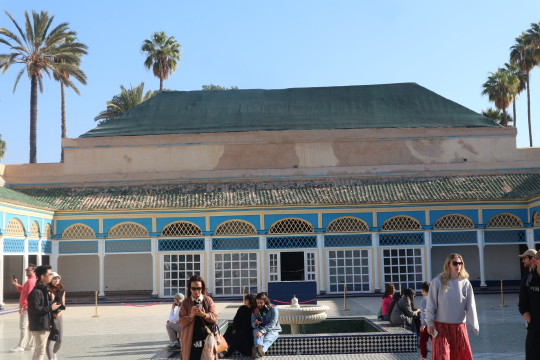
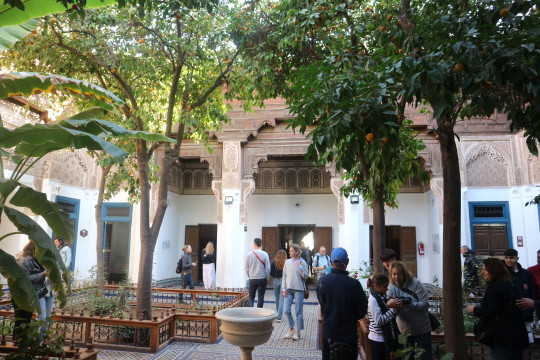

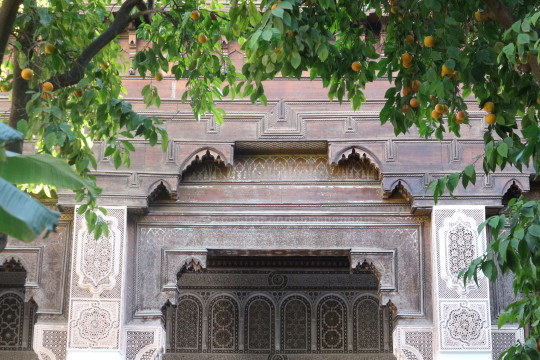
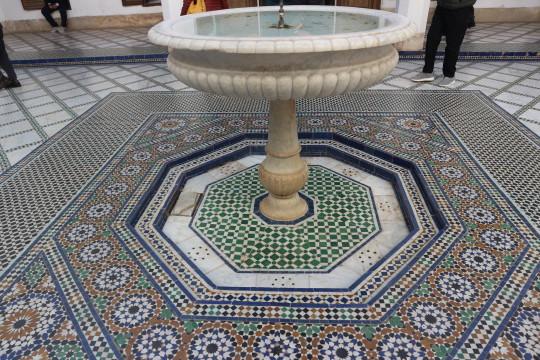


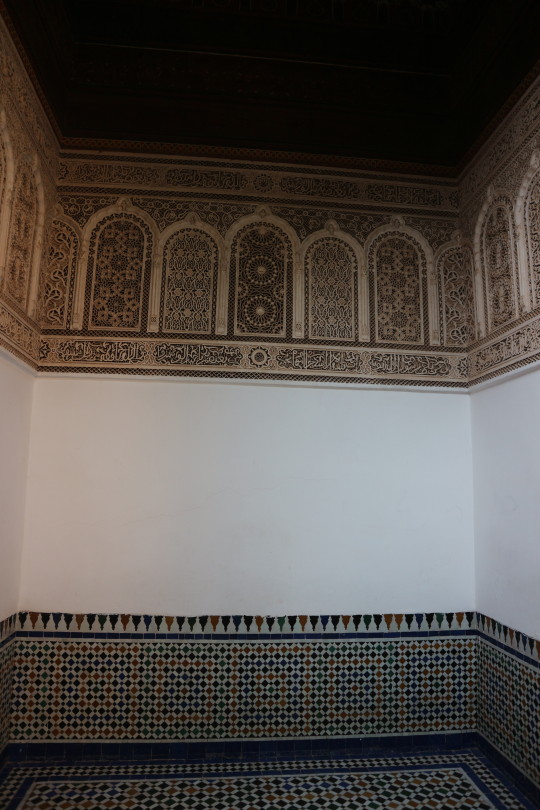

“No monarchies have fallen, no monarchies have even come close to falling, and that’s not by mistake”. Shadi Hamid.
The fourth part of my Morocco series; please see here, here, here, here, and here for the rest. (This is a post about modern Morocco; Moroccan history stretches back thousands of years and I hope you’ll read my other posts for more).
Bahia Palace was built in 1859 by Si Musa, a descendant of African slaves who rose to become vizier to, and power behind the throne of, Mohammed IV of the Alaouite dynasty, which has ruled Morocco since 1666. The architect was Muhammad ibn Makki al-Misfiwi.
In the 19th century, Morocco was beset by foreign powers, especially Spain and France, which had haunted Africa since Napoleon’s campaign in Egypt in 1798. France was piling on the pressure after conquering Morocco’s neighbour, Algeria, in 1830.
There was no sign of fear at this gorgeous place though: the attention to detail is extraordinary and while it’s annoying that tourists are in most of the pictures, this place has always been open; (9) and (10) are where petitions were received.
If you look carefully there is a difference; while (9) is beautifully inscribed with Koranic verses and is for the Muslim majority, (10), equally lush, does not have this; here is where Jews, who have lived in Morocco for hundreds of years, would be received. (The wealthy philanthropist Moses Montefiore came to Morocco in 1863, as he came to other countries in the Middle East and North Africa, where he found a large Jewish community and worked to better their lot; Morocco’s Jews were and are under the protection of the rulers of Morocco, whom they have always served, and Morocco still has a Jewish community today, though far fewer than before the state of Israel was founded in 1948; most Jews moved to the new state or to Europe, though thousands still live here).
Soon after this Mohammed IV died in 1873 and was succeeded by his son Hassan I, who successfully fended off European pressure until he died in 1894.
Between 1894 and 1900 this was home to Ba Ahmed, Si Musa’s son, who was the real ruler of Morocco as he governed in the name of Abdelaziz, son and heir of Hassan I.
(Around 2-3% of Moroccans are migrants from sub-Saharan Africa, and there is also an admixture of African blood from the descendants of former slaves, who were often raped or sold into forced marriage by their owners, and from higher-status African soldiers and politicians such as Ba Ahmed ibn Musa, whose descendants still have a high profile in Morocco’s elite).
Abdelaziz took power in his own right when he came of age, but was forced to abdicate by his brother Abd Al Hafid in 1908. Abd al Hafid lasted only four years before pressure from France and Spain forced him to agree to Morocco being divided between the two European powers in the Treaty of Fez 1912, which was so unpopular that he had to abdicate and flee to France, where he died in 1937.
This part of Morocco became a French protectorate in which the sultanate and old elite had less power than French Resident Louis-Hubert Gonzales-Lyautey, and Abd Al Hafid was succeeded by his brother Yusuf; Yusuf was sultan until 1927 though he did not get to wield real power.
Mohammed V, Yusef’s son, who had been exiled by the French in 1953, came back in triumph in 1956 and became King of an independent state; after Morocco helped win World War 2 by hosting the Casablanca Conference of 1943, and given American sympathy, this was inevitable, and Morocco became what it is now.
Morocco was not free from trouble as, almost as soon as it had become independent, it fought the Sand War against Algeria in 1963; 99 were confirmed dead and hundreds more probably fell in a senseless conflict in which both sides tried to overturn the French colonial borders, and neither succeeded then or since.
As I said, while France withdrew from Morocco in 1956, the other empire, Spain, stayed until 1975 in what is now Western Sahara. When they left there was bitter disagreement over what came next. This is hotly contested as almost all Moroccans, as my tour guide couldn’t help pointed out, believe that Morocco is the rightful ruler of this land, to the south of internationally recognised Morocco.
However, the Polisario movement on that territory claims to be Western Sahara’s rightful rulers and Mohammed V’s son, Hassan II (who had shared Mohammed V’s exile and ruled from his father’s death in 1961) fought a bitter war from 1975 until a ceasefire was reached, without full agreement, in 1991.
(Spain, meanwhile, still occupies the African cities of Ceuta and Melilla, which rather shows up their grandstanding about Gibraltar).
Morocco���s neighbours in the African Union disapproved of Hassan’s actions, and Morocco was suspended for 32 years. On rejoining in 2017, Hassan’s son Mohammed VI (who succeeded his father in 1999, from the same Alaouite dynasty that built this palace) said “Africa is my home and I am coming back home”. Despite the above-named problems, Morocco is one of the most stable and peaceful countries in the Middle East and North Africa; the Arab Spring, which broke out in nearby Tunisia in 2011, has had little impact here, the reforming constitution of 2011 and the forward policies of Mohammed VI fulfilling the aspirations of for most Moroccans, who are leaving behind the old poverty. (The leading quote is from 2013 and as I write in 2024, things are much as they were then).
This has been a tourist attraction (as you can see, rather too many!) since Hassan II’s time; Lyautey and Mohammed V had lived here, but now it is a museum to Morocco’s rulers, who have shaken off their past, and to that tradition of ceramics which can also be seen in the bustling souk, subject of a later post.
1 note
·
View note
Text
On this day in Wikipedia: Saturday, 6th January
Welcome, ようこそ (yōkoso), willkommen, 欢迎 (huānyíng) 🤗 What does @Wikipedia say about 6th January through the years 🏛️📜🗓️?

6th January 2022 🗓️ : Death - F. Sionil José Francisco Sionil Jose, Philippine novelist (b.1924) "Francisco Sionil José (December 3, 1924 – January 6, 2022) was a Filipino writer who was one of the most widely read in the English language. A National Artist of the Philippines for Literature, which was bestowed upon him in 2001, José's novels and short stories depict the social underpinnings of..."
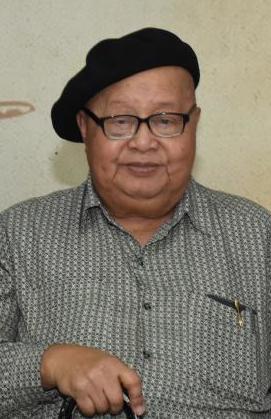
Image by Development Academy of the Philippines
6th January 2019 🗓️ : Event - Muhammad V of Kelantan Muhammad V of Kelantan resigns as the Yang di-Pertuan Agong of Malaysia, becoming the first monarch to do so. "Sultan Muhammad V (Jawi: سلطان محمد ٥; born 6 October 1969) is Sultan of Kelantan since ascending to the throne in 2010. He previously reigned as the fifteenth Yang di-Pertuan Agong of Malaysia from 2016 until his abdication in 2019. He was proclaimed Sultan of Kelantan on 13 September 2010,..."
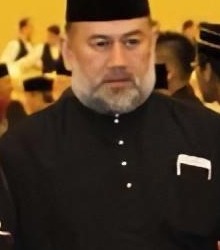
Image licensed under CC BY 4.0? by New Zealand Ministry of Foreign Affairs / New Zealand High Commission Kuala Lumpur. MFAT images licenced CC-BY according to terms here https://www.mfat.govt.nz/en/copyright/ and expansion here https://twitter.com/MFATNZ/status/1273066079514812417
6th January 2014 🗓️ : Event - Benefits Street The first episode of the documentary series Benefits Street aired on Channel 4, prompting discussion in the United Kingdom about welfare dependency. "Benefits Street is a British documentary series broadcast on Channel 4. It followed the lives of benefit claimants and showed them committing crimes, including a demonstration of how to shoplift, and portrayed a situation in which people are dependent on benefits and lack the motivation to seek..."
6th January 1974 🗓️ : Event - 1973 oil crisis In response to the 1973 oil crisis, daylight saving time commences nearly four months early in the United States. "In October 1973, the Organization of Arab Petroleum Exporting Countries (OAPEC) announced that it was implementing a total oil embargo against the countries that had supported Israel at any point during the Fourth Arab–Israeli War, which began after Egypt and Syria launched a large-scale surprise..."
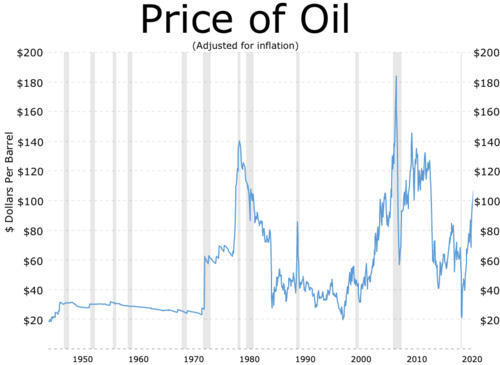
Image by Macrotrends
6th January 1924 🗓️ : Birth - Kim Dae-jung Kim Dae-jung, South Korean soldier and politician, 8th President of South Korea, Nobel Prize laureate (d. 2009) "Kim Dae-jung (Korean: 김대중; Hanja: 金大中; Korean pronunciation: [kim.dɛ.dʑuŋ]; 6 January 1924 – 18 August 2009), often referred to by his initials DJ, was a South Korean politician and activist who served as the 8th (15th election) president of South Korea from 1998 to 2003. He was a 2000 Nobel Peace..."

Image licensed under KOGL Type 1? by 대한민국 국가기록원
6th January 1822 🗓️ : Birth - Heinrich Schliemann Heinrich Schliemann, German archaeologist and businessman (d. 1890) "Johann Ludwig Heinrich Julius Schliemann (German: [ˈʃliːman]; 6 January 1822 – 26 December 1890) was a German businessman and an influential amateur archaeologist. He was an advocate of the historicity of places mentioned in the works of Homer and an archaeological excavator of Hisarlik, now..."

Image licensed under CC BY-SA 4.0? by
Ed. Schultze Hofphotograph Heidelberg Plöckstrasse 79
6th January 🗓️ : Holiday - Christian Feast day: January 6 (Eastern Orthodox liturgics) "January 5 - Eastern Orthodox liturgical calendar - January 7 All fixed commemorations below are observed on January 19 by Eastern Orthodox Churches on the Old Calendar.For January 6th, Orthodox Churches on the Old Calendar commemorate the Saints listed on December 24...."

Image by njk92
0 notes
Photo

3 November 2017 | Prince Charles, Prince of Wales and Camilla, Duchess of Cornwall meet with His Majesty The Yang di-Pertuan Agong XV Sultan Muhammad V for a photograph at his official residence, Istana Negara in Kuala Lumpur, Malaysia. (c) Yui Mok - Pool/Getty Images
2 notes
·
View notes
Photo

Sultan of Kelantan Crown ♕ Sultan Muhammad V of Kelantan
#sultan of kelantan#sultan muhammad v#muhammad of kelantan#crown#crown jewels#diamond crown#gold crown#malaysia#malaysia royal families#malaysia crown jewels#royal jewels
25 notes
·
View notes
Photo
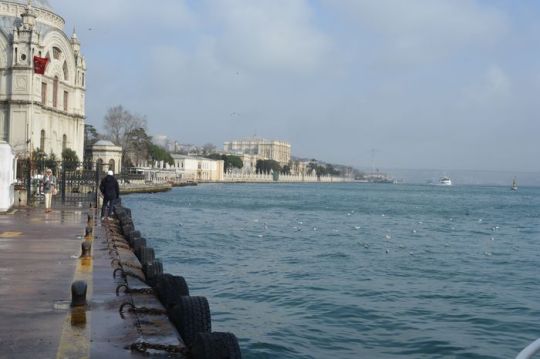
Sultan Muhammad V
The Sultan. — The present Sultan, H. I. M. Sultan Muhammad V., thirty-fifth Ottoman Sultan since the foundation of the Turkish Dynasty, and twenty-fifth of his line since the taking of Constantinople, was horn on the 3rd November 1844, and ascended the throne on the 28th April 1909. He is of a generous and very kindly disposition; he is the first real constitutional Sultan Turkey ever had, and is extremely popular among the people. Before he ascended the throne he was confined by his elder brother Sultan Abd-ul-Hamid Khan II. in the small low building which adjoins his present residence, the Volmah Baghcheh Palace.
People.—The population of Constantinople is a mixed one, composed chiefly of Turks, Greeks, Armenians, Levantines, as the half-breed descendants of Europeans are styled, and Jews.
The Turks, as their name implies, were originally of Turkoman descent; the race, however, is at present a very mixed one, owing to the continual introduction, through intermarriage, of the Arab and Circassian elements.
God will provide
The average Turk is of medium stature, with dark hair and an aquiline nose, and is noted for his punctilious politeness and hospitality, which latter he inherits from his nomadic ancestors, and for his indolence and apathy. This latter quality often stands him in good stead in the event of disaster or misfortune, which, like good fortune, he attributes to the will of God, or more often to Kismet (fate); he is in fact nothing if not a fatalist, and the Kismet of the Turk has become even more proverbial than his politeness and hospitality. This apathy, for it cannot be dignified by the name of stoicism, may be accountable for the comparative absence of suicide among the Turks, who console themselves for the greatest losses or mishaps, private or national, by piously ejaculating Kismet dir (‘ it is fate ’) guided istanbul tours, or Allah kerim (‘ God will provide ’). The Turk is extremely simple in his habits, frugal and sober, and on the whole may be said to be good- natured, easy-going, fairly truthful, and charitable; but is, on the other hand, extremely superstitious, and utterly destitute of any but the crudest artistic taste, and of any liking for the fine arts.
Even in his pleasures and pastimes his indolence and apathy assert themselves. His games are all of a sedentary nature, and he will sit for hours over a succession of games of backgammon. He never dances, all his appreciation of the Terpsichorean art being confined to viewing from his cushioned divan, through the fragrant mediums of coffee and cigarettes, the lascivious posturings and contortions of gipsy girls, performed to the accompaniment of monotonous, dirge-like strains.
The Turk’s favourite pastime is what he calls Keyeffy which is somewhat akin to the dolce far niente or sweet idleness of the Italian. This ‘ enjoyment ’ is attainable by repairing to some picturesque spot, and sitting for hours in listless, thoughtless, vacant contemplation, over the soothing coffee and cigarette. This is kcyeff downright, pure, unadulterated keyejf or whatever one likes to call it, for the word baffles all translation.
0 notes
Photo

Sultan Muhammad V
The Sultan. — The present Sultan, H. I. M. Sultan Muhammad V., thirty-fifth Ottoman Sultan since the foundation of the Turkish Dynasty, and twenty-fifth of his line since the taking of Constantinople, was horn on the 3rd November 1844, and ascended the throne on the 28th April 1909. He is of a generous and very kindly disposition; he is the first real constitutional Sultan Turkey ever had, and is extremely popular among the people. Before he ascended the throne he was confined by his elder brother Sultan Abd-ul-Hamid Khan II. in the small low building which adjoins his present residence, the Volmah Baghcheh Palace.
People.—The population of Constantinople is a mixed one, composed chiefly of Turks, Greeks, Armenians, Levantines, as the half-breed descendants of Europeans are styled, and Jews.
The Turks, as their name implies, were originally of Turkoman descent; the race, however, is at present a very mixed one, owing to the continual introduction, through intermarriage, of the Arab and Circassian elements.
God will provide
The average Turk is of medium stature, with dark hair and an aquiline nose, and is noted for his punctilious politeness and hospitality, which latter he inherits from his nomadic ancestors, and for his indolence and apathy. This latter quality often stands him in good stead in the event of disaster or misfortune, which, like good fortune, he attributes to the will of God, or more often to Kismet (fate); he is in fact nothing if not a fatalist, and the Kismet of the Turk has become even more proverbial than his politeness and hospitality. This apathy, for it cannot be dignified by the name of stoicism, may be accountable for the comparative absence of suicide among the Turks, who console themselves for the greatest losses or mishaps, private or national, by piously ejaculating Kismet dir (‘ it is fate ’) guided istanbul tours, or Allah kerim (‘ God will provide ’). The Turk is extremely simple in his habits, frugal and sober, and on the whole may be said to be good- natured, easy-going, fairly truthful, and charitable; but is, on the other hand, extremely superstitious, and utterly destitute of any but the crudest artistic taste, and of any liking for the fine arts.
Even in his pleasures and pastimes his indolence and apathy assert themselves. His games are all of a sedentary nature, and he will sit for hours over a succession of games of backgammon. He never dances, all his appreciation of the Terpsichorean art being confined to viewing from his cushioned divan, through the fragrant mediums of coffee and cigarettes, the lascivious posturings and contortions of gipsy girls, performed to the accompaniment of monotonous, dirge-like strains.
The Turk’s favourite pastime is what he calls Keyeffy which is somewhat akin to the dolce far niente or sweet idleness of the Italian. This ‘ enjoyment ’ is attainable by repairing to some picturesque spot, and sitting for hours in listless, thoughtless, vacant contemplation, over the soothing coffee and cigarette. This is kcyeff downright, pure, unadulterated keyejf or whatever one likes to call it, for the word baffles all translation.
1 note
·
View note
Text
New Post has been published on
Sultan Muhammad V
The Sultan. — The present Sultan, H. I. M. Sultan Muhammad V., thirty-fifth Ottoman Sultan since the foundation of the Turkish Dynasty, and twenty-fifth of his line since the taking of Constantinople, was horn on the 3rd November 1844, and ascended the throne on the 28th April 1909. He is of a generous and very kindly disposition; he is the first real constitutional Sultan Turkey ever had, and is extremely popular among the people. Before he ascended the throne he was confined by his elder brother Sultan Abd-ul-Hamid Khan II. in the small low building which adjoins his present residence, the Volmah Baghcheh Palace.
People.—The population of Constantinople is a mixed one, composed chiefly of Turks, Greeks, Armenians, Levantines, as the half-breed descendants of Europeans are styled, and Jews.
The Turks, as their name implies, were originally of Turkoman descent; the race, however, is at present a very mixed one, owing to the continual introduction, through intermarriage, of the Arab and Circassian elements.
God will provide
The average Turk is of medium stature, with dark hair and an aquiline nose, and is noted for his punctilious politeness and hospitality, which latter he inherits from his nomadic ancestors, and for his indolence and apathy. This latter quality often stands him in good stead in the event of disaster or misfortune, which, like good fortune, he attributes to the will of God, or more often to Kismet (fate); he is in fact nothing if not a fatalist, and the Kismet of the Turk has become even more proverbial than his politeness and hospitality. This apathy, for it cannot be dignified by the name of stoicism, may be accountable for the comparative absence of suicide among the Turks, who console themselves for the greatest losses or mishaps, private or national, by piously ejaculating Kismet dir (‘ it is fate ’) guided istanbul tours, or Allah kerim (‘ God will provide ’). The Turk is extremely simple in his habits, frugal and sober, and on the whole may be said to be good- natured, easy-going, fairly truthful, and charitable; but is, on the other hand, extremely superstitious, and utterly destitute of any but the crudest artistic taste, and of any liking for the fine arts.
Even in his pleasures and pastimes his indolence and apathy assert themselves. His games are all of a sedentary nature, and he will sit for hours over a succession of games of backgammon. He never dances, all his appreciation of the Terpsichorean art being confined to viewing from his cushioned divan, through the fragrant mediums of coffee and cigarettes, the lascivious posturings and contortions of gipsy girls, performed to the accompaniment of monotonous, dirge-like strains.
The Turk’s favourite pastime is what he calls Keyeffy which is somewhat akin to the dolce far niente or sweet idleness of the Italian. This ‘ enjoyment ’ is attainable by repairing to some picturesque spot, and sitting for hours in listless, thoughtless, vacant contemplation, over the soothing coffee and cigarette. This is kcyeff downright, pure, unadulterated keyejf or whatever one likes to call it, for the word baffles all translation.
0 notes
Photo

Sultan Muhammad V
The Sultan. — The present Sultan, H. I. M. Sultan Muhammad V., thirty-fifth Ottoman Sultan since the foundation of the Turkish Dynasty, and twenty-fifth of his line since the taking of Constantinople, was horn on the 3rd November 1844, and ascended the throne on the 28th April 1909. He is of a generous and very kindly disposition; he is the first real constitutional Sultan Turkey ever had, and is extremely popular among the people. Before he ascended the throne he was confined by his elder brother Sultan Abd-ul-Hamid Khan II. in the small low building which adjoins his present residence, the Volmah Baghcheh Palace.
People.—The population of Constantinople is a mixed one, composed chiefly of Turks, Greeks, Armenians, Levantines, as the half-breed descendants of Europeans are styled, and Jews.
The Turks, as their name implies, were originally of Turkoman descent; the race, however, is at present a very mixed one, owing to the continual introduction, through intermarriage, of the Arab and Circassian elements.
God will provide
The average Turk is of medium stature, with dark hair and an aquiline nose, and is noted for his punctilious politeness and hospitality, which latter he inherits from his nomadic ancestors, and for his indolence and apathy. This latter quality often stands him in good stead in the event of disaster or misfortune, which, like good fortune, he attributes to the will of God, or more often to Kismet (fate); he is in fact nothing if not a fatalist, and the Kismet of the Turk has become even more proverbial than his politeness and hospitality. This apathy, for it cannot be dignified by the name of stoicism, may be accountable for the comparative absence of suicide among the Turks, who console themselves for the greatest losses or mishaps, private or national, by piously ejaculating Kismet dir (‘ it is fate ’) guided istanbul tours, or Allah kerim (‘ God will provide ’). The Turk is extremely simple in his habits, frugal and sober, and on the whole may be said to be good- natured, easy-going, fairly truthful, and charitable; but is, on the other hand, extremely superstitious, and utterly destitute of any but the crudest artistic taste, and of any liking for the fine arts.
Even in his pleasures and pastimes his indolence and apathy assert themselves. His games are all of a sedentary nature, and he will sit for hours over a succession of games of backgammon. He never dances, all his appreciation of the Terpsichorean art being confined to viewing from his cushioned divan, through the fragrant mediums of coffee and cigarettes, the lascivious posturings and contortions of gipsy girls, performed to the accompaniment of monotonous, dirge-like strains.
The Turk’s favourite pastime is what he calls Keyeffy which is somewhat akin to the dolce far niente or sweet idleness of the Italian. This ‘ enjoyment ’ is attainable by repairing to some picturesque spot, and sitting for hours in listless, thoughtless, vacant contemplation, over the soothing coffee and cigarette. This is kcyeff downright, pure, unadulterated keyejf or whatever one likes to call it, for the word baffles all translation.
0 notes
Text

“Lmao Muhammad V is happily photographed holding his newborn nephew (& the heir after his own brother) while he denied paternity of his own son (who looks exactly like him) & abandoned his pregnant ex without bothering to pay appropriate amount of child support. Guess his sister-in-law Sofie knows this looks bad, that's why she blocked the comment option for this photo on her account lol.” - Submitted by Anonymous
14 notes
·
View notes
Text
youtube
*** ENABLE CC FOR ENGLISH SUBTITLES ***
New Video: Ilham, Khaas Ilham Aur Wahi Mein Farq | Sufi Master Younus AlGohar | ALRA TV https://www.youtube.com/watch?v=rVUdKHXqX4I
Sufi Master Younus AlGohar delivers a marvellous discourse on the blessed occasion of Jashan e Shahi, the day His Divine Eminence Gohar Shahi was coroneted as Sultan in the Court of Prophet Muhammad (s). In this video, Sufi Master reveals some selected features of HDE Gohar Shahi's esoteric personality; the difference between divine revelations and special revelations and why Gabriel accompanied the revelations; the pact of Radia Mardia between God and his friends, as well as several other incredible topics.
✅ Get the latest updates from ALRA TV on Telegram Messenger. Download Telegram Messenger from the AppStore or Google PlayStore and subscribe to: https://t.me/official_alratv
❓ Question Sufi Master Younus AlGohar directly! Text your questions to us on WhatsApp: +447472540642 or Facebook messenger: http://m.me/alratv
Watch the live recordings of these lectures every day at 22:00 GMT at: http://www.younusalgohar.com
For Izn e Zikr-e-Qalb (Permission for Awakening of the Spiritual Heart) call Shaykh Amjad Gohar on this number +44 (0) 740 1855 568 via WhatsApp.
📱Social Media Instagram: http://instagram.com/alratv https://www.instagram.com/younus_algohar
Twitter: https://twitter.com/AlRa_TV https://twitter.com/mehdifoundation https://twitter.com/MessiahFdn https://twitter.com/younusalgohar
Facebook: https://www.facebook.com/alratv/ https://www.facebook.com/HHYounusAlGo…
Websites: http://www.goharshahi.us/ http://www.theawaitedone.com/ http://thereligionofgod.com http://www.younusalgohar.org/
NEW URDU LANGUAGE WEBSITE http://www.mehdifoundation.com/
#Imam Mehdi#Gohar Shahi#Younus AlGohar#Sufism#Ilham#Revelation#Motivation#Enlighten Heart#Spirituality#Divine Love#Inner Peace#Sufi Master#Youtube
0 notes
Text
Events 7.4 (1840-1940)
1838 – The Iowa Territory is organized. 1845 – Henry David Thoreau moves into a small cabin on Walden Pond in Concord, Massachusetts. Thoreau's account of his two years there, Walden, will become a touchstone of the environmental movement. 1855 – The first edition of Walt Whitman's book of poems, Leaves of Grass, is published in Brooklyn. 1862 – Lewis Carroll tells Alice Liddell a story that would grow into Alice's Adventures in Wonderland and its sequels. 1863 – American Civil War: Siege of Vicksburg: The Confederate army in Vicksburg, Mississippi surrenders to Union forces under Ulysses S. Grant after 47 days of siege, contributing to the Union capture of the Mississippi River. 1863 – American Civil War: Union forces repulse a Confederate army at the Battle of Helena in Arkansas. The battle thwarts a Rebel attempt to relieve pressure on the besieged city of Vicksburg, and paves the way for the Union capture of Little Rock. 1863 – American Civil War: Retreat from Gettysburg: The Confederate Army of Northern Virginia under Robert E. Lee withdraws from the battlefield after losing the Battle of Gettysburg, signaling an end to his last invasion of the North. 1879 – Anglo-Zulu War: The Zululand capital of Ulundi is captured by British troops and burned to the ground, ending the war and forcing King Cetshwayo to flee. 1881 – In Alabama, the Tuskegee Institute opens. 1886 – The Canadian Pacific Railway's first scheduled train from Montreal arrives in Port Moody on the Pacific coast, after six days of travel. 1887 – The founder of Pakistan, Quaid-i-Azam Muhammad Ali Jinnah, joins Sindh-Madrasa-tul-Islam, Karachi. 1892 – Western Samoa changes the International Date Line, causing Monday (July 4) to occur twice, resulting in a leap year with 367 days. 1894 – The short-lived Republic of Hawaii is proclaimed by Sanford B. Dole. 1898 – En route from New York to Le Havre, the SS La Bourgogne collides with another ship and sinks off the coast of Sable Island, with the loss of 549 lives. 1901 – William Howard Taft becomes American governor of the Philippines. 1903 – The Philippine–American War is officially concluded. 1910 – The Johnson–Jeffries riots occur after African-American boxer Jack Johnson knocks out white boxer Jim Jeffries in the 15th round. Between 11 and 26 people are killed and hundreds more injured. 1911 – A massive heat wave strikes the northeastern United States, killing 380 people in eleven days and breaking temperature records in several cities. 1913 – President Woodrow Wilson addresses American Civil War veterans at the Great Reunion of 1913. 1914 – The funeral of Archduke Franz Ferdinand and his wife Sophie takes place in Vienna, six days after their assassinations in Sarajevo. 1918 – Mehmed V died at the age of 73 and Ottoman sultan Mehmed VI ascends to the throne. 1918 – World War I: The Battle of Hamel, a successful attack by the Australian Corps against German positions near the town of Le Hamel on the Western Front. 1927 – First flight of the Lockheed Vega. 1939 – Lou Gehrig, recently diagnosed with Amyotrophic lateral sclerosis, informs a crowd at Yankee Stadium that he considers himself "The luckiest man on the face of the earth", then announces his retirement from major league baseball.
0 notes
Photo

Sultan Muhammad V
The Sultan. — The present Sultan, H. I. M. Sultan Muhammad V., thirty-fifth Ottoman Sultan since the foundation of the Turkish Dynasty, and twenty-fifth of his line since the taking of Constantinople, was horn on the 3rd November 1844, and ascended the throne on the 28th April 1909. He is of a generous and very kindly disposition; he is the first real constitutional Sultan Turkey ever had, and is extremely popular among the people. Before he ascended the throne he was confined by his elder brother Sultan Abd-ul-Hamid Khan II. in the small low building which adjoins his present residence, the Volmah Baghcheh Palace.
People.—The population of Constantinople is a mixed one, composed chiefly of Turks, Greeks, Armenians, Levantines, as the half-breed descendants of Europeans are styled, and Jews.
The Turks, as their name implies, were originally of Turkoman descent; the race, however, is at present a very mixed one, owing to the continual introduction, through intermarriage, of the Arab and Circassian elements.
God will provide
The average Turk is of medium stature, with dark hair and an aquiline nose, and is noted for his punctilious politeness and hospitality, which latter he inherits from his nomadic ancestors, and for his indolence and apathy. This latter quality often stands him in good stead in the event of disaster or misfortune, which, like good fortune, he attributes to the will of God, or more often to Kismet (fate); he is in fact nothing if not a fatalist, and the Kismet of the Turk has become even more proverbial than his politeness and hospitality. This apathy, for it cannot be dignified by the name of stoicism, may be accountable for the comparative absence of suicide among the Turks, who console themselves for the greatest losses or mishaps, private or national, by piously ejaculating Kismet dir (‘ it is fate ’) guided istanbul tours, or Allah kerim (‘ God will provide ’). The Turk is extremely simple in his habits, frugal and sober, and on the whole may be said to be good- natured, easy-going, fairly truthful, and charitable; but is, on the other hand, extremely superstitious, and utterly destitute of any but the crudest artistic taste, and of any liking for the fine arts.
Even in his pleasures and pastimes his indolence and apathy assert themselves. His games are all of a sedentary nature, and he will sit for hours over a succession of games of backgammon. He never dances, all his appreciation of the Terpsichorean art being confined to viewing from his cushioned divan, through the fragrant mediums of coffee and cigarettes, the lascivious posturings and contortions of gipsy girls, performed to the accompaniment of monotonous, dirge-like strains.
The Turk’s favourite pastime is what he calls Keyeffy which is somewhat akin to the dolce far niente or sweet idleness of the Italian. This ‘ enjoyment ’ is attainable by repairing to some picturesque spot, and sitting for hours in listless, thoughtless, vacant contemplation, over the soothing coffee and cigarette. This is kcyeff downright, pure, unadulterated keyejf or whatever one likes to call it, for the word baffles all translation.
0 notes
Photo

Sultan Muhammad V
The Sultan. — The present Sultan, H. I. M. Sultan Muhammad V., thirty-fifth Ottoman Sultan since the foundation of the Turkish Dynasty, and twenty-fifth of his line since the taking of Constantinople, was horn on the 3rd November 1844, and ascended the throne on the 28th April 1909. He is of a generous and very kindly disposition; he is the first real constitutional Sultan Turkey ever had, and is extremely popular among the people. Before he ascended the throne he was confined by his elder brother Sultan Abd-ul-Hamid Khan II. in the small low building which adjoins his present residence, the Volmah Baghcheh Palace.
People.—The population of Constantinople is a mixed one, composed chiefly of Turks, Greeks, Armenians, Levantines, as the half-breed descendants of Europeans are styled, and Jews.
The Turks, as their name implies, were originally of Turkoman descent; the race, however, is at present a very mixed one, owing to the continual introduction, through intermarriage, of the Arab and Circassian elements.
God will provide
The average Turk is of medium stature, with dark hair and an aquiline nose, and is noted for his punctilious politeness and hospitality, which latter he inherits from his nomadic ancestors, and for his indolence and apathy. This latter quality often stands him in good stead in the event of disaster or misfortune, which, like good fortune, he attributes to the will of God, or more often to Kismet (fate); he is in fact nothing if not a fatalist, and the Kismet of the Turk has become even more proverbial than his politeness and hospitality. This apathy, for it cannot be dignified by the name of stoicism, may be accountable for the comparative absence of suicide among the Turks, who console themselves for the greatest losses or mishaps, private or national, by piously ejaculating Kismet dir (‘ it is fate ’) guided istanbul tours, or Allah kerim (‘ God will provide ’). The Turk is extremely simple in his habits, frugal and sober, and on the whole may be said to be good- natured, easy-going, fairly truthful, and charitable; but is, on the other hand, extremely superstitious, and utterly destitute of any but the crudest artistic taste, and of any liking for the fine arts.
Even in his pleasures and pastimes his indolence and apathy assert themselves. His games are all of a sedentary nature, and he will sit for hours over a succession of games of backgammon. He never dances, all his appreciation of the Terpsichorean art being confined to viewing from his cushioned divan, through the fragrant mediums of coffee and cigarettes, the lascivious posturings and contortions of gipsy girls, performed to the accompaniment of monotonous, dirge-like strains.
The Turk’s favourite pastime is what he calls Keyeffy which is somewhat akin to the dolce far niente or sweet idleness of the Italian. This ‘ enjoyment ’ is attainable by repairing to some picturesque spot, and sitting for hours in listless, thoughtless, vacant contemplation, over the soothing coffee and cigarette. This is kcyeff downright, pure, unadulterated keyejf or whatever one likes to call it, for the word baffles all translation.
0 notes